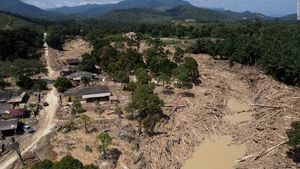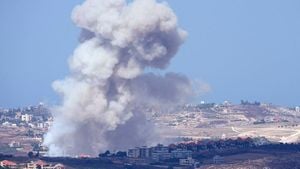Nicaragua, once vibrant with its rich culture and history, has become synonymous with loss, dislocation, and despair. The current leadership under President Daniel Ortega has intensified its clampdown on dissent, leaving many Nicaraguans stripped of their citizenship and rendered stateless as they navigate life far from home.
This situation came sharply to light with the recent exile of over 450 political prisoners, including activists, religious leaders, journalists, and students, who have been forcibly removed from their homeland under dire and traumatic circumstances. Among the group is Sergio Mena, a young rural activist who became emblematic of the larger stateless crisis. Mena's activism against Ortega’s oppressive regime cost him dearly, culminating not just in his imprisonment but also his subsequent stripping of citizenship.
On September 4, 2024, Mena and 134 others were loaded onto flights to Guatemala, their Nicaraguan identities erased. For many, this sudden transition to statelessness disoriented them, leaving them vulnerable and without basic rights. The Ortega administration's approach seeks to erase public opposition by rendering dissenters invisible both legally and socially. Mena's story poses significant questions about identity, belonging, and what it truly means to call one’s self Nicaraguan.
"One day I was home, and the next day, I was stripped of everything I knew," Mena reflects, illustrating the plight faced by many of his compatriots. Without citizenship documents, they are barred from accessing jobs, healthcare, and education, leading to lives filled with uncertainty and fear. The sense of loss runs deep for those exiled; they not only left their homes but also their families, friends, and the very essence of their identities.
Nicaragua’s crisis roots back more than just this recent purge. For years, Ortega and his administration have purportedly operated under authoritarianism, stifling dissent through intimidation, violence, and undemocratic practices. Since civil unrest began to escalate around 2018, many citizens have protested against government corruption, human rights abuses, and increasingly oppressive measures. Protesters have faced brutal crackdowns, leading some to flee, others to be imprisoned, and many to live under constant surveillanc. This has led to apprehension and increased distrust among the populace.
User sentiment lies fraught with fear of the repercussions highlighted by the government's violent stance. Displaced Nicaraguans abroad often speak candidly about the trauma they suffer, constantly worried about family members left behind who might face repercussions for their escape. Community members abroad attempt to connect with their roots but find it hard without citizenship or identification. Some describe themselves as living ghosts, existing without recognition or support.
Nicaragua’s plight is not merely one of lost citizenship but is also about the repercussions of global apathy. Human rights organizations have lamented the silence of the international community. The U.N. stated, "The violation of citizenship rights is alarming and requires urgent intervention." Yet, international pressure to restore democracy or safeguard the rights of exiled Nicaraguans remains minimal.
Nicaraguans spread across various countries, from the United States to Costa Rica, where many have sought asylum from the Ortega regime's oppression, encounter obstacles as they attempt to build new lives. Some have received temporary protection, yet the uncertain legal frameworks leave them vulnerable. Without secure documentation, they facilities, housing, employment, and opportunities remain just out of reach. How does one rebuild one's life when denied the very essence of identity?
Financially, survival poses incredible strains. Many Nicaraguans find themselves working low-wage jobs, struggling to sustain themselves and their families. The urgency only intensifies when considering the significant remittances many send back home to assist relatives still living under Ortega's reign. This additional stress leads to mental health issues, often overlooked due to stigma against mental illness, especially across traditional societies like Nicaragua.
But within the adversity sprouts resilience; countless Nicaraguans are organizing, uniting their voices for change. Grassroots movements have formed, focusing on creating awareness of the plight of the stateless and finding ways to apply pressure for regeneration of political rights back home. Activists are leveraging social media platforms to share their experiences. They insist, "We will not be forgotten." Their aim is not only to restore their citizenship but also to bring justice to those who've suffered under the oppressive regime.
While the immediate focus remains on the current crisis, many Nicaraguans are advocating for the recognition of the broader rights of refugees and stateless individuals. Agencies such as UNHCR and local NGOs have begun to play pivotal roles, facilitating legal assistance, resources, and psychological support for stateless families. The work being done is encouraging yet feels insufficient to combat the pervasive political struggles raging inside Nicaragua.
Going forward, international pressure will likely play various roles. Several countries have offered sympathy but lack standalone actions to protect the stateless population comprehensively. Echoing calls from Nicaraguans, activist groups urge, "We demand accountability and recognition. Statelessness should not mean invisibility." The goal includes establishing strong policies for recovery and support for their cause.
Meanwhile, the Ortega government appears to maintain its grip on power as it pushes dissenters beyond national borders, attempting to dilute opposition by scattering them across the globe. Mena's determination reflects many others facing similar struggles, as he loudly proclaims, "We exist. We will not be silenced, and we will continue fighting for our rights, our home, and our identity." But the question remains: how long will they be made to fight against political injustices? Can the world afford to ignore the plight of Nicaraguans stateless and struggling? With vigilant activism marking the future, their voices echo—and for those listening, the story must be shared and awareness raised so it does not become just another footnote of history steeped with oppression.



